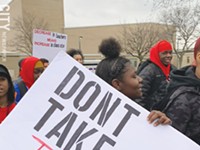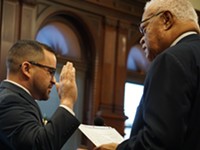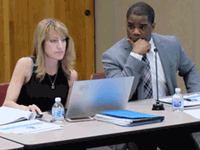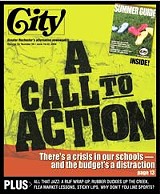A call to action
There’s a crisis in our schools --- and the budget’s a distraction
By Mary Anna Towler[
{
"name": "500x250 Ad",
"insertPoint": "5",
"component": "15667920",
"parentWrapperClass": "",
"requiredCountToDisplay": "1"
}
]
There's a crisis in our schools --- and the budget's a distraction
When City Council votes on the Rochester school budget next week, odds are it will do what Mayor Bill Johnson wants it to do: give the district $7 million less than it has asked for.
One reason is that the city has budget problems of its own. But just as important is the continuing rancor between the city and the district. City officials don't trust the district's budget process or its numbers. And they're convinced that the district wastes money.
Talking to the two sides is like talking to people from two different cities. Each side is convinced that it is right. But this drama has played out over and over again, through successive city administrations, City Councils, superintendents, and School Boards.
The conclusion is inescapable: some way must be found to cut through the arguments and mistrust and unite the two sides, for the sake of the district and its students, for the sake of the city and its residents, for the sake of Monroe County and the region.
That will require a community-wide effort, and it must begin now. There is no greater challenge facing the Rochester region.
Johnson's proposed budget inflicts considerable pain on the school district. His $7 million combined with the cost of school nurses, which Monroe County has covered in the past, means the district must cut an additional $11 million from next year's budget. Rather than expand programs for its neediest students, the district will reduce them.
City officials say that's the district's fault, that had district officials budgeted wisely over the past few years, there would be plenty of money. They return, repeatedly, to the fact that the district's expenses have gone up while enrollment has dropped. And indeed, that's the case. Enrollment in city schools since the school year 1999-2000 has gone down by 3218. In that same period, the budget has increased by more than $120 million.
The enrollment figures are a bit deceptive, however. For example, about 2000 of the enrollment decline is due to students enrolled in charter schools, which began operating in Rochester in 2000. City students who attend charter schools in Rochester are not included in the district's enrollment total. But the district pays the tuition for those students, which exceeds the state aid that the district gets for them.
The district also pays for charter-school students' textbooks. It pays for their transportation. All of those costs are included in the district's budget.
A more realistic comparison of the district's enrollment and expenses would include charter-school enrollment.
It would also include the 2159 city children enrolled in pre-kindergarten programs, which began in 1998-99. As with charter schools, those children are not included in the district's enrollment figures --- but the costs of the pre-k programs are.
With the inclusion of the children in those two programs, the district's enrollment shows a growth, not a decline.
In addition, in 2001-02 the district began offering full-day kindergarten, which in most schools previously had been a half-day program. One teacher had taught two kindergarten classes: one morning, one afternoon. The practical effect of that change: increasing the number of kindergarten classes and teachers --- but not the enrollment.
The purpose of both pre-kindergarten and full-day kindergarten is to help prepare the district's poorest children for school: to try to compensate for the lack of language and other skills that children from more affluent, better-educated families have.
The district has also faced extraordinary cost increases not under its control. Like governments throughout the state, it has been hit with major increases in contributions to employee pension funds. Like every employer, public and private, it has faced major increases in health-insurance costs: $13.4 million, 59 percent, since 1999-2000. It has had major increases in transportation costs, in utility costs. All of these increases have been well above the rate of inflation.
Because of its poverty rate, the district has a high percentage of children with physical disabilities, some of whom need intensive assistance in order to attend school. Some, in fact, need an adult aide with them in the classroom almost constantly. The need for special assistance --- one aide to five children, and in some cases, one aide dedicated to one child --- drives the district's costs up and the staff-pupil ratio down.
At the same time, the district has added new instructional programs, seeking ways to overcome students' learning problems. It has added staff and launched programs to rescue failing students. It has lowered class sizes.
None of these needs will go away. The district's costs will increase. And apparently, the rancor between the district and City Hall won't go away any time soon either.
City officials can hardly contain their anger. They are convinced that the district deliberately messes with its budget, changing its format every year so the public, and city officials, can't see what's going on.
When the district says that to hire qualified teachers, it must offer salaries competitive with those in the suburbs, city officials say that teachers are already paid well, that their salaries are competitive. When district officials say they are having trouble hiring qualified teachers in math, science, special education, bilingual education, and foreign languages, city officials say they're lying. ("A myth perpetrated by the teachers union," insisted one official last week.)
An obvious solution would be to have the district's budget audited, and compared to those of suburban districts, by a third party agreeable to district and city officials. But that probably wouldn't still the criticism. Clearly, the school budget has increased dramatically in the past five years, and city officials are convinced that the district can do what it needs to do on what it has.
The arguments and the hostility are symptoms of stress on both parties. And that stress will not be alleviated by tracking down every dollar in the school budget. The district has made some serious mistakes, and several years ago there was a serious lack of oversight. But those mistakes were not made out of malice or personal greed. And if we could undo them, if we could reinvent the past, the reality of the district would not change.
The reality is that the district is responsible for educating more than 30,000 children, most of whom are poor, many of whom are from poorly educated families with multiple special needs.
The school district cannot fulfill that responsibility by itself, but the community is insisting that it do just that. It is important for the district to spend its money wisely. And it's important that the community trust that the district is doing so. But the budget is a distraction from the real challenge.
The real challenge is the education of the children of the City of Rochester, the hope of the future of the Community of Monroe and of the region. The burden for meeting that challenge is on the community. The community, however, is not convinced of that.
For more than 30 years, this newspaper has argued that the solution to the district's problems is school integration: breaking up the concentration of poverty in the schools. That solution is light years away. In the meantime, Rochester children need help.
And so, this newspaper's Call to Action.
Nearly 20 years ago, there was another Call to Action. In January 1985 a Rochester leader, concerned about the low achievement of the city's poorest children, initiated a community-wide study of the problem, in a search for solutions. The man who initiated that study is currently mayor of the City of Rochester.
Then, as now, the conclusion was obvious: the school district could improve, but the long-term answer was in broad community action. In March 1986, the task force that conducted the study issued its report, "A Call to Action," recommending specific actions by every segment of the community.
Some individual businesses and organizations answered the call. And many of the initiatives the district has embarked on since then --- lower class sizes, extra help for teachers, expanded parent outreach --- are mentioned specifically in that 1986 Call.
But much of the community has turned its attention away, finding it easier to blame the school district than to step up to its own responsibility. A prime example: the county's cancellation of school-nurse funding. Nurses provide health care, not education, and there is no logical reason for the school district to pay for them.
That shirking of responsibility can no longer continue. It is time to renew the Call to Action of two decades ago, time for community leaders --- preferably leaders not associated with either the school district or City Hall --- to initiate a new community discussion.
This community has leaders of conscience, talent, and wisdom. We urge them to step forward now.
An earlier 'Call'
Excerpts from the 1986 Call to Action:
There is a crisis in our community. We are failing our young people, failing to adequately prepare them to assume their roles, failing to prepare them to cope in the society we have created.
Students are graduating from city high schools with little or no job skills or further education goals. Some graduate practically illiterate. Many more never graduate at all. There are great costs to this, and greater costs to come if nothing is done to change the situation. There will be increased expenses for public assistance, for crime prevention, for drug rehabilitation, for jails and prisons.
But the costs in human life and human dignity will be even greater, as more and more of our young people will be consigned to an unproductive and unfulfilling existence. As a nation, we recently mourned the loss of seven astronauts. So should we mourn the loss of so many lives being wasted in our own community every day.
Be assured: the problem belongs to all of us --- not just to the Board of Education --- not just to the school administrators, principals, and teachers --- not just to parents. The problem belongs to all of us: businesses, unions, social service agencies, churches and synagogues, governments at all levels, cultural institutions, our colleges and universities, and the students themselves. All of us share responsibility for the problem, and all of us can contribute to finding solutions.
What is required is a radical adjustment to traditional ways of thinking about the responsibility for education. We need to come together and address the problem. We need to bring energy, determination, and boldness with us. We must act out of a sense of compassion, yes, but also out of a sense of justice, and out of a sense of enlightened self-interest.
There is hope in this crisis: it lies in this community's history of resourcefulness in solving problems. We can respond. We must respond. We cannot delay. We must commit the required resources. We must do it now. We call upon our community to rise to this new challenge.
We call this community to action.
Explore more related to this subject by clicking here!Speaking of...
-

Martin Luther King Jr. Day commemorations to stream and attend
Jan 14, 2021 -

Advocates urge Rochester district to balance cuts
Apr 9, 2020 -

New year, new City Council
Jan 2, 2020 - More »
Latest in Featured story
More by Mary Anna Towler
-

Police reform: advocates on what should come next
Oct 22, 2019 -

Court clears the way for Police Accountability referendum
Oct 17, 2019 -

Dade outlines initial actions on district deficit
Oct 9, 2019 - More »






